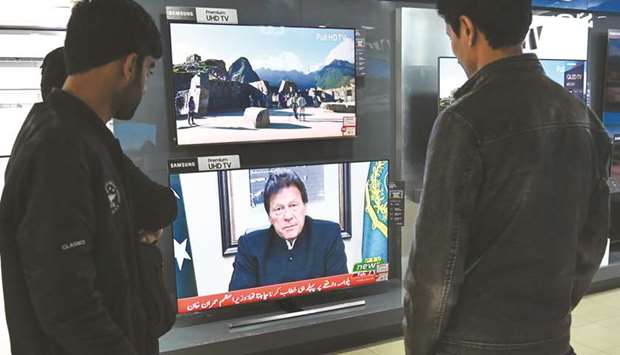Prime Minister Imran Khan pledged yesterday to take action if India produced proof that Pakistanis were involved in the Kashmir bombing that killed dozens of people last week.
A suicide bomber rammed his explosive-laden car into a convoy of police in India-administered Kashmir’s Pulwama district, killing 40 troopers, in what was one of the worst such attacks in the disputed region.
Militant group Jaish-e-Mohamed (JeM), which allegedly operates from Pakistan, claimed responsibility for the bombing, escalating tensions between Islamabad and New Delhi.
Yesterday, Prime Minister Khan hit back at suspicions of Pakistani involvement, and issued a warning to New Delhi.
“If you have actionable intelligence about involvement of any Pakistani, share it with us. I assure you that we will take action,” he said.
Khan said that “we will take action not because we are under pressure, but because if someone is using Pakistani soil, he is acting as enemy of Pakistan. It is against our interest”.
“We are hearing voices from India that Pakistan should be taught a lesson,” he said. “Pakistan will not think about retaliation, we will retaliate. You will leave us with no other option.”
He also struck a conciliatory note however: “We all know that it is easy to start a war but God knows where it would end, therefore, I hope that better sense will prevail.”
India’s foreign ministry hit back by saying: “It is a well-known fact that Jaish-e-Mohamed and its leader Masood Azhar are based in Pakistan. These should be sufficient proof for Pakistan to take action.”
“We demand Pakistan to stop misleading the international community and take credible and visible action against the perpetrators of the attack and other terrorists and terror groups operating from areas under their control.”
Pakistan’s National Security Council, a joint forum of political and military leadership, is scheduled to meet this week to prepare a response to the situation emerging out of the bombing, officials said.
Pakistan’s high commissioner to New Delhi, who was called back to Islamabad on Monday, held a series of meetings in the capital to brief political and military leaders about the situation.
There were also wider diplomatic moves, with Pakistan seeking an intervention by the United Nations.
Foreign Minister Shah Mehmood Qureshi wrote a letter to UN chief Antonio Guterres, asking him to help calm tensions between the nuclear-armed rivals.
“Attributing it to Pakistan even before investigations is absurd,” Qureshi said in the letter. “It is with a sense of urgency that I draw your attention to the deteriorating security situation in our region resulting from the threat of use of force against Pakistan by India.”
“It is imperative to take steps for de-escalation. The United Nations must step in to defuse tensions,” he wrote.
New Delhi has threatened to isolate Pakistan diplomatically.
On Monday, Prime Minister Narendra Modi rejected the possibility of talks with Islamabad.
Modi, facing a general election by May, has come under pressure to exact revenge, and has said he has given his security forces a free hand to administer a “strong response”.
The nuclear-capable South Asian neighbours have fought three wars, two of them over Kashmir which is currently divided in two parts, one administered by India and the other by Pakistan.
While they have not waged full-scale war since, they both tested nuclear weapons in 1998, they have engaged in countless skirmishes along their de facto boundary in the mountains of Kashmir.
India-administered Kashmir has seen a secessionist movement since the mid-1980s.
More than 44,500 people have died in the violence.
India blames Pakistan for nurturing militants who carry out strikes in Kashmir.
Islamabad denies the charge.
Pakistan has long said it only provides moral and diplomatic support to the Kashmiri people in their struggle for self-determination.
Prime Minister Khan said his country had changed.
“I am telling you clearly that this is new Pakistan. This is a new mind set, this is new thinking,” he said.

Pakistanis watch as Prime Minister Imran Khan addresses the nation on the bombing attack in Indian-administered Kashmir.
